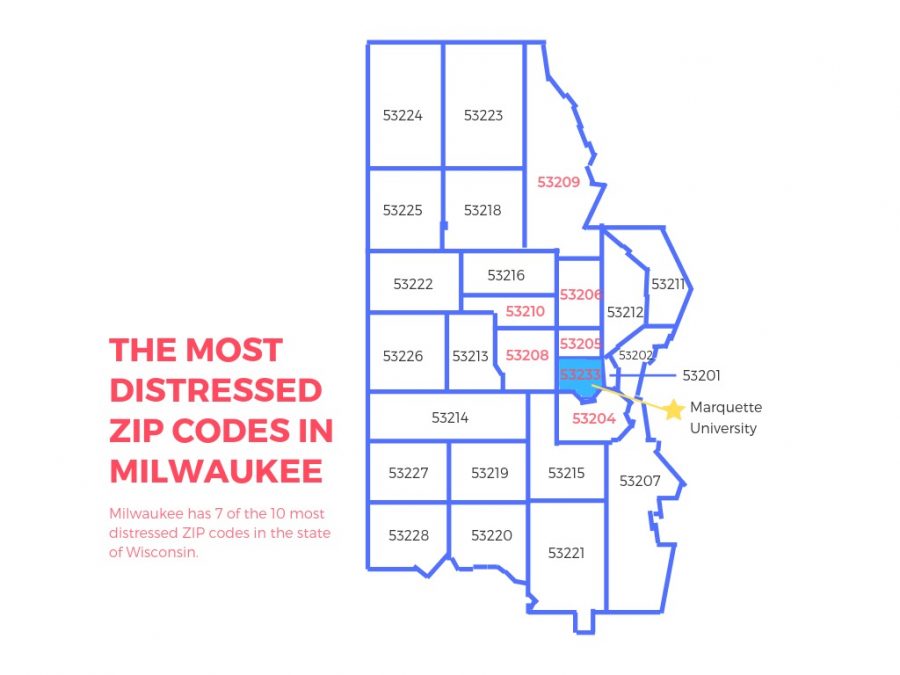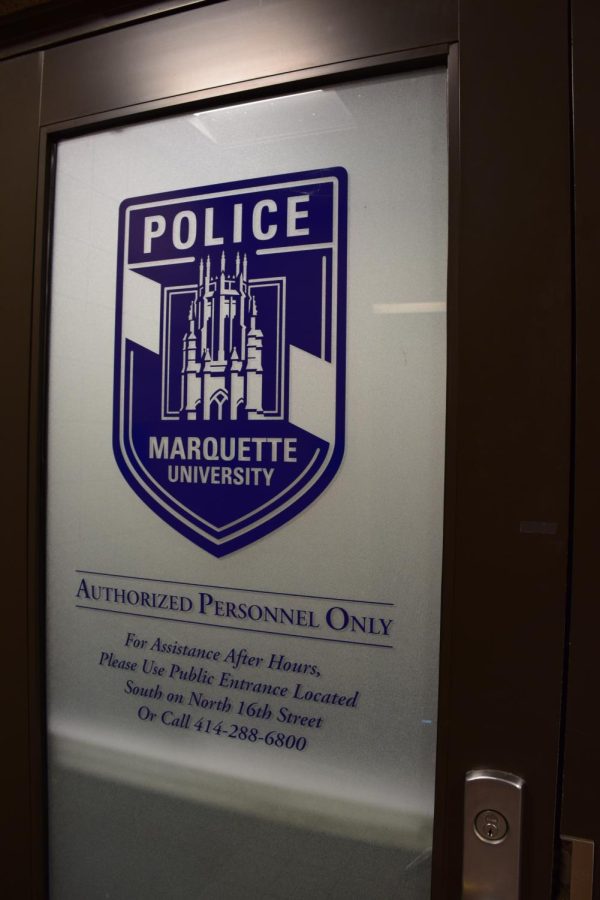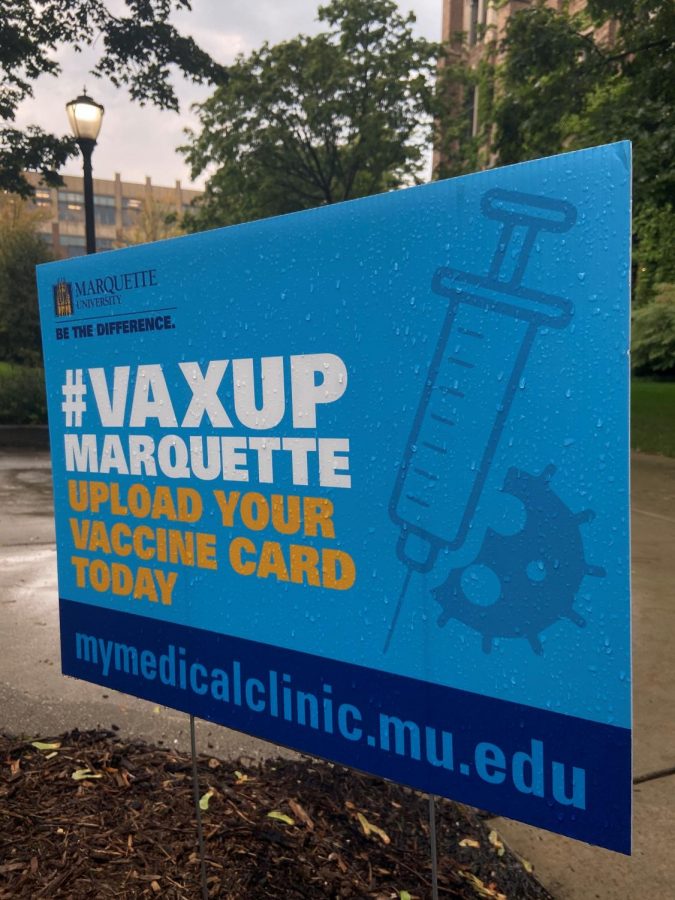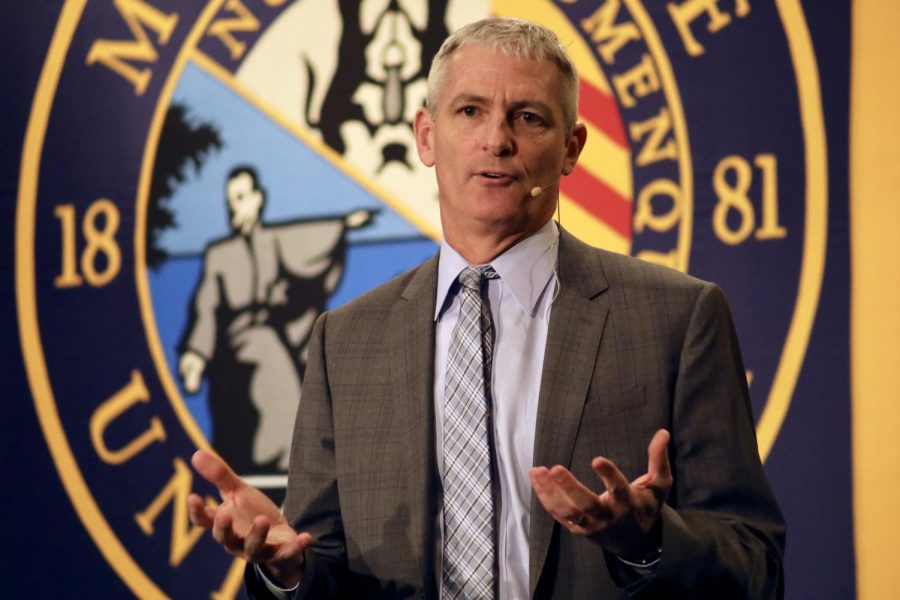53233, the ZIP code home to Marquette University, is the most economically distressed ZIP code in the state of Wisconsin, according to the Economic Innovation Group.
The EIG’s 2018 Distressed Communities Index, published in October, detailed this finding by using U.S. Census Bureau data to rank each of the country’s ZIP codes into one of five categories: prosperous, comfortable, mid-tier, at risk and distressed.
According to the EIG’s index, seven of the 10 most distressed ZIP codes in Wisconsin are located in Milwaukee.
The EIG’s report indicated that economics is not the single factor that leads to a city’s distress. Other social and psychological conditions, such as mental illness or drug abuse, can cause cities to experience downward spirals and fixed socioeconomic statuses.
Noncombat trauma exposure can also affect distressed communities in Wisconsin.
The most common and harmful forms of noncombat trauma involve chronic or repeated stress such as sexual violence, substance abuse, and living in threatening environments, John Grych, a professor of psychology at Marquette, said.
“In Milwaukee, like other places in the United States, poverty and racism greatly increase the odds that children and adults will experience chronic stress,” Grych said.
He said both chronic stress and trauma have pervasive and adverse effects on one’s mental and physical health.
“For example, exposure to adversity is associated with mental health problems such as depression, anxiety and substance abuse, and physical health problems such as cardiovascular disease and compromised immune functioning,” Grych said.
He added that chronic stress has a particularly harmful impact on the developing brain and can undermine one’s language development, learning, memory and emotional regulation, while also impairing one’s capacity to respond to later stress.
The effects of stress and trauma on cognitive functioning and the ability to adaptively control and express emotion can make it more difficult to do everyday tasks that depend on learning, memory and attention, Grych said.
These chronic physical and mental health problems can affect a child’s ability to succeed in school and work later in life, Grych said. These issues can also result in substantial health care costs and loss of productivity.
“The effects of trauma exposure have a staggering human cost: Millions of children struggle to reach their potential as they grow into adults, and many fail out of school, work low-paying jobs or end up incarcerated,” Grych said. “This is tragic at both personal and societal levels, (and) the nation loses when so many of its members fail to develop their talents and skills.”
University President Michael Lovell and his wife Amy said they have committed themselves to stopping this pattern and improving trauma care in Milwaukee.
Lovell created his initiative Scaling Wellness In Milwaukee in early 2018 to join human services, health care, education and criminal justice groups to improve trauma care in the city.
“Psychological trauma and economic distress are inextricably linked. That’s why the work we are doing with SWIM will not only help individuals, families and whole communities heal psychologically and socially, it will also have a long term positive effect on economic issues, including poverty, wage disparities, urban blight and underdevelopment,” Lovell said in an email.
Lovell said when looking at the most distressed communities in Milwaukee and the rest of the state, as well as around the nation, psychological trauma exists in epidemic proportions in those same communities.
Biluge Ntabala, a freshman in the College of Arts & Sciences, is a Milwaukee native who recognizes both trauma and distress in her home and campus communities.
She said segregation, racism and discrimination are negative realities that contribute to economic and social distress that affect many people.
SWIM is needed because many people suffer in silence, Ntabala said.
She said everyone experiences trauma, but not everyone has the resources to heal and overcome distress.
“I think that people need to be encouraged to be vulnerable, be open about their pain and seek help as best as they can,” Ntabala said.
Amy said her organization, REDGen, was a catalyst for SWIM.
REDGen stands for resiliency, education, and determined to make a difference in the health of a new generation.
“REDgen’s mission is to advocate for youth mental health and well-being,” Amy said. “We are a completely volunteer-run organization that has increased awareness on youth trauma through its programming.”
To support the economy in Milwaukee, REDGen works to promote wellness and self care among children, which in turn can create a healthier workforce, Amy said.
She said these initiatives and organizations are crucial to the Marquette and Milwaukee communities because they provide awareness.
“Awareness is the first step to change,” Amy said. “By increasing conversations about mental health, wellness and adverse experiences, more people can become aware, reflect and hopefully begin a path toward recovery and healing.”
This process can reduce the stigma surrounding trauma and mental illness and create resilience and prevention, she added.
“The most resilient people are people who have had adversity but are reflective,” Amy said. “The demands for behavioral health care are great and collaborations are necessary. If we can educate more people on the effects of adverse experiences, we have a better shot at prevention.”










Harold A Maio • Jan 15, 2019 at 2:46 pm
—reduce the stigma ????
No.
Indeed not, educate those who say there is one, they have done quite enough harm.